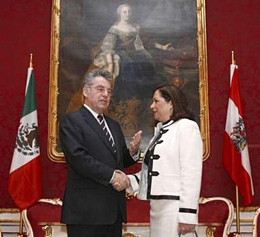 |
 |
 |
 News Around the Republic of Mexico | February 2007 News Around the Republic of Mexico | February 2007  
Mexican Tortilla Protests Not National Crisis
 Dow Jones Dow Jones


| | Austrian President Heinz Fischer receives Mexico's Foreign Minister Patricia Espinosa Cantellano in front of a painting of former Austrian Empress Maria-Theresia in his office in Vienna February 1, 2007. (Reuters/Heinz-Peter Bader) |
Vienna - Mexico's foreign secretary on Thursday sought to play down recent mass demonstrations in her homeland over a sharp rise in the price of tortillas, a diet staple of the poor. She said they do not signify a national crisis.

"It is of course a particularly important and problematic situation that no one expected," Patricia Espinosa told reporters in the Austrian capital, saying Mexican officials were working on the issue and that President Felipe Calderon had already made decisions.

"We hope it will be fine in the coming weeks and months," Espinosa said.

She declined to provide more details.

"I wouldn't qualify it as a national crisis," she said.

Since taking office Dec. 1 after a disputed election, Calderon has drawn his greatest criticism for failing to control the largest tortilla price rise in decades. With the new prices, workers earning the minimum wage could spend a third of their earnings on tortillas for their families.

Espinosa, a former Mexican ambassador to Austria, made her remarks at Austria's Foreign Ministry, where she met with her counterpart Ursula Plassnik.

On Wednesday, 75,000 unionists, farmers and leftists marched through Mexico City to protest price increases in basic foodstuffs such as tortillas, a direct challenge to Calderon's market-oriented economic policies, which some say have widened the gulf between rich and poor.

Espinosa highlighted the importance of cooperation in the fight against organized crime when asked whether Mexico's extradition last month of a group of drug traffickers to the U.S. was an attempt to improve relations with Washington.

"We need cooperation, so this is the reason why we have this very important extradition treaty with the U.S., and we are making use of it now in order to strengthen our fight against organized crime," Espinosa said.

Mexican officials have said the Calderon government was willing to extradite the alleged drug traffickers because they continued to run their operations from prison in Mexico, not because of U.S. pressure.

In the past, Mexico has been reluctant to extradite major Mexican drug barons wanted in the U.S., arguing they should face justice at home first. They also refused to send anyone to the U.S. who would face the death penalty, which is illegal in Mexico. | 
 | |
 |



